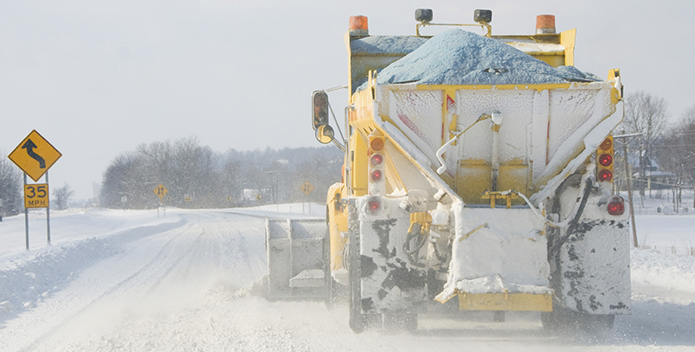As another polar vortex pays an unwelcome visit to our region, the salt trucks are out in full force. And the thousands of tons of salt spread on our roads and sidewalks can have harmful effects on the health of our rivers, streams, and the Chesapeake Bay.
After their initial job is complete, the salt and other chemicals used as deicers eventually find their way into our waterways. The increased salinity, particularly in freshwater rivers and streams, can be toxic to aquatic life. Salt can also kill vegetation on the side of roads and harm birds. What's more, some of the chemicals used as deicers include nitrates which can stimulate harmful algal blooms and dead zones.
Spreading less salt and refraining from using deicers that include nitrates are the obvious first steps to alleviate the salinity of our waterways. But a closer look reveals that our ultimate solution is to reduce all polluted runoff through the introduction of natural filters. These include planting forested buffers, building rain gardens, and incorporating other green infrastructure in our communities. Natural filters will not only reduce the amount of salt entering our waterways in the winter, but also the fertilizers, pesticides, oil, and countless other contaminants throughout the year.
While the warm days of summer might feel years away, the actions we take now will help determine the health of the waterways we will swim and fish in a few short months. And with the implementation of the Chesapeake Clean Water Blueprint, we will leave a legacy of clean water measured not in years, but generations.
This Week in the Watershed: Hellbender Defenders, Reducing Runoff, and Climate Consequences
- Trends of more extreme rain events and warmer weather caused by climate change are threatening Bay cleanup efforts. (Bay Journal)
- Legislation to designate the Eastern hellbender Pennsylvania's official state amphibian took a step forward Tuesday, as it received unanimous approval out of the Senate committee and will now move to the full Senate for approval. (York Daily Record—PA) BONUS: Learn more about the hellbender campaign!
- Communities are rallying behind Tangier Island, as the island lost running water after a main water line broke. (Daily Times—VA)
- A bipartisan agreement will recycle or move a massive amount of toxic coal ash to eliminate its threat to clean water. (Chesapeake Bay Magazine) BONUS: CBF Press Statement
- CBF Pennsylvania Executive Director Harry Campbell writes on the value of polluted runoff fees to combat the onslaught of pollution in the Keystone State's rivers and streams. (Times Leader—PA)
What's Happening around the Watershed?
January 12-February 11
- Throughout Virginia: Help restore the health of the Chesapeake Bay and Virginia's rivers by participating in CBF's Grasses for the Masses program. Participants grow wild celery, a type of underwater grass, in their homes for 10-12 weeks. After 10-12 weeks of grow-out, participants will gather to plant their grasses in select local rivers to bolster grass populations and help restore the Bay. With workshops held throughout Virginia, there's plenty of opportunity to get involved. Find a workshop near you!
February 6
- Annapolis, MD: Come on out for an informative afternoon with the Maryland environmental community. Hear from advocates and elected officials about Maryland's environmental legislative priorities. Learn more here!
February 12
- Virginia Beach, VA: Join us for our next installment of our Brock Environmental Learning Series, as we dive into caring for your yard and practices that can save the Bay, your back, and your wallet. Reserve your spot now!
February 21
- Baltimore, MD: Join us for the second film in Docs on the Docks film series, featuring the award-winning documentary Trash Dance. This film highlights the unseen men and women who pick up our trash. Immediately following the viewing, an expert panel will discuss the film and encourage participants to advocate for change in their communities, city, and watershed. Register here!




